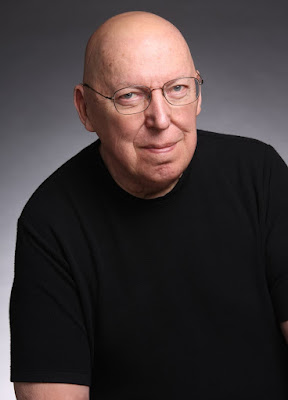I recently had a discussion with a friend about the origins of COVID-19 and Communist China.
I suggested that he read Charles McCarry’s spy novel, The Shanghai Factor.
I covered the novel and the late, great spy novelist in my Washington
Times On Crime column in 2020.
You can read the column via the below link or the below text:
A look back at spy novelist Charles McCarry - Washington Times
I wonder what the late, great spy novelist Charles McCarry (seen in the above photo) would make of the COVID-19 outbreak and the Chinese connection, be it the Wuhan “wet markets” or the science labs near Wuhan.
McCarry, who died last year at the age 88, set his 2013 novel
“The Shanghai Factor” in China.
“China, hidden and mysterious, has always interested me,”
McCarry said in an interview with Publisher’s Weekly. “I’ve written about it in
other novels before ‘The Shanghai Factor,’ and in order to save the life of my
series hero, Paul Christopher, locked the poor fellow up for 10 years in a
one-prisoner jail in a desert in Xianjing province.”
In “The Shanghai Factor,” the narrator, a 29-year-old American
intelligence officer in China, explained how he first encountered a Chinese
woman named Mei.
“One day, as I pedaled along Zhonghan Road, she crashed her
bicycle into mine. In those days I was new to the life as a spy, so my paranoia
wasn’t yet fully developed, but I immediately suspected that this was no
accident. My first thought was that Chinese counterintelligence had sniffed me
out and sent this temptress to entrap me. Then I took a look at the temptress
and wondered why I should mind.”
Later in the novel, McCarry writes, “I was sure from the start
that she was on duty, that she reported everything, that she had bugged my
room. The funny thing was, she never asked for information, never probed.”
Mei, McCarry wrote, showed no curiosity about his past history
or life.
“Probably this was because she had been briefed about this matter by the folks at Guoanbu, the Chinese intelligence service (within Headquarters called “MSS,” short for Ministry of State Security) and had no reason to ask.”
I enjoyed “The Shanghai Factor,” as I have his other
novels, including “The Tears of Autumn” which in my view is his finest novel.
This brilliant novel covers the assassination of President Kennedy and the
Vietnam War, and although I don’t subscribe to the conspiracy he portrays in
the novel, I recommend highly this most interesting and insightful spy novel.
McCarry knew something about espionage, having served as a deep
cover CIA officer for 10 years in the 1950s and 1960s. The New Republic called
Charles McCarry “the poet laureate of the CIA.” He has also been called the
American John le Carre, a spy novelist he is often compared to.
Writing in The Weekly Standard, P.J. O’Rourke noted, “unlike le
Carre, McCarry knows right from wrong. His theme is never that the other side
is just like our side except on the other side.”
Melanie Kirkpatrick wrote in National Review that “Charles
McCarry is sometimes called a ‘conservative John le Carre’ for his highly
intelligent espionage thrillers. The difference is that while le Carre presents
George Smiley and his Soviet foe Karla as moral equivalents, McCarry believes
in the superiority of Western ideals. His spy novels depict the unpleasant,
even tragic, actions that are sometimes necessary to preserve those ideals.”
Otto Penzler, the publisher and editor of crime and spy fiction,
has stated that Charles McCarry was “inarguably the greatest espionage writer
that America ever produced.” He also said that McCarry was the most poetic of
all American spy writers.
Mr. Penzler, whom I interviewed in a previous column, published
a Charles McCarry short story for his collection of stories about espionage,
“Agents of Treachery,” in 2010. I suspect McCarry will also appear in Mr.
Penzler’s upcoming “Big Book of Espionage Stories.”
Mr. Penzler also noted, “although there was no nicer or more brilliant man on the planet, McCarry’s gift of prophecy, or anticipating things to come, was chilling.” For example, in his 1979 novel, “The Better Angels,” McCarry anticipated suicide bombers and offered a fictional terrorist plot that predated 9/11 by 20 years.
Although he never received the popular fame that Ian Fleming or
John le Carre enjoyed, by all accounts he had a full and satisfying life,
personally and professionally.
McCarry was born in 1930 in Massachusetts, and he served in the
U.S. Army as a correspondent for the Stars and Stripes newspaper. He later
served as a speechwriter for President Eisenhower and then became a CIA
officer. As a deep cover officer, McCarry traveled around the world, both as a
spy and as a part-time journalist. He left the CIA in 1967 and wrote his first
novel, “The Miernik Dossier,” in 1971.
Charles McCarry should be read by every student of espionage and
by every reader that loves spy fiction.
• Paul Davis On Crime column covers true
crime, crime fiction, mysteries and thrillers.








No comments:
Post a Comment